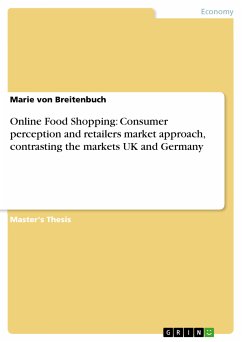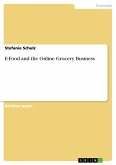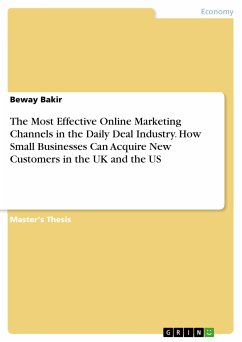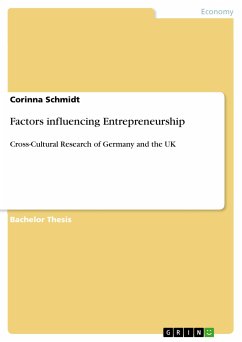Master's Thesis from the year 2004 in the subject Business economics - Offline Marketing and Online Marketing, grade: 61 points (B), Bournemouth University (Business School), course: International Business Administration, language: English, abstract: The research's aim was to contrast the retailers' market approach and consumer perception of online food shopping in the markets Germany and UK. The first part of the research project was the review of existing literature to build up knowledge about the history and definition of the Internet and to give a market overview of Germany and the UK. The next areas investigated within the literature review were consumers' online shopping behaviour and the food retail market. The last part was concerned with specific companies from both countries and their market approach. Research questions developed in the literature review were concerned with the food shopping behaviour and the perception of online food shopping. Additional questions were if payment security has an influence on online shopping and what other market sectors are of interest. The first part of the survey collecting quantitative data was carried out within a sample of 100 food shoppers from the UK and 100 from Germany. Questionnaires were distributed using the snowball sampling method - a method where each respondent passes the questionnaire to a number of further contacts. Interviews built the second survey part where two participants from each country were questioned in-depth about their food shopping behaviour and perceptions. The interviews backed findings from the questionnaire survey and gave further information. Quantitative data was gained and analysed by using the program SPSS. SPSS is a tool that provides the possibility to run statistical correlations between variables and provides graphical outputs to illustrate the findings. The findings show great differences in consumer perception and retailers' market approach between Germany and the UK. While in the UK online food shopping is popular with consumers and some retailers found a way of establishing themselves in this market, German companies do not offer the service nationwide and consumers seem to have limited interest. Main reasons identified in the research lie in the differences within the economical markets and culture of the countries. The outlook in the future shows an ongoing increase in online food shopping in the UK but less activities in Germany.
Dieser Download kann aus rechtlichen Gründen nur mit Rechnungsadresse in A, B, BG, CY, CZ, D, DK, EW, E, FIN, F, GR, HR, H, IRL, I, LT, L, LR, M, NL, PL, P, R, S, SLO, SK ausgeliefert werden.









